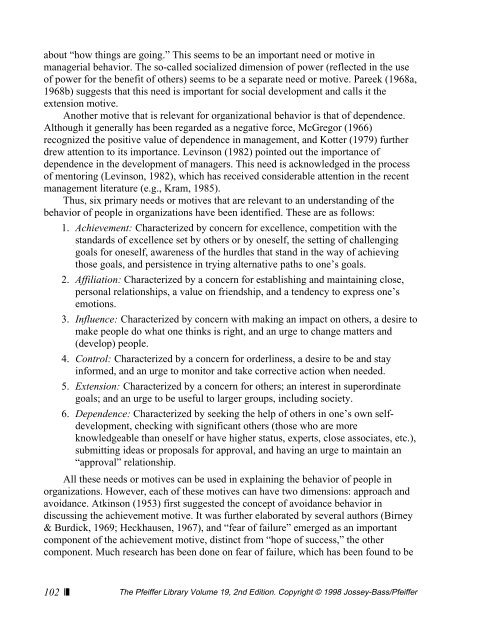motivational analysis of organizations
motivational analysis of organizations
motivational analysis of organizations
You also want an ePaper? Increase the reach of your titles
YUMPU automatically turns print PDFs into web optimized ePapers that Google loves.
about “how things are going.” This seems to be an important need or motive in<br />
managerial behavior. The so-called socialized dimension <strong>of</strong> power (reflected in the use<br />
<strong>of</strong> power for the benefit <strong>of</strong> others) seems to be a separate need or motive. Pareek (1968a,<br />
1968b) suggests that this need is important for social development and calls it the<br />
extension motive.<br />
Another motive that is relevant for organizational behavior is that <strong>of</strong> dependence.<br />
Although it generally has been regarded as a negative force, McGregor (1966)<br />
recognized the positive value <strong>of</strong> dependence in management, and Kotter (1979) further<br />
drew attention to its importance. Levinson (1982) pointed out the importance <strong>of</strong><br />
dependence in the development <strong>of</strong> managers. This need is acknowledged in the process<br />
<strong>of</strong> mentoring (Levinson, 1982), which has received considerable attention in the recent<br />
management literature (e.g., Kram, 1985).<br />
Thus, six primary needs or motives that are relevant to an understanding <strong>of</strong> the<br />
behavior <strong>of</strong> people in <strong>organizations</strong> have been identified. These are as follows:<br />
1. Achievement: Characterized by concern for excellence, competition with the<br />
standards <strong>of</strong> excellence set by others or by oneself, the setting <strong>of</strong> challenging<br />
goals for oneself, awareness <strong>of</strong> the hurdles that stand in the way <strong>of</strong> achieving<br />
those goals, and persistence in trying alternative paths to one’s goals.<br />
2. Affiliation: Characterized by a concern for establishing and maintaining close,<br />
personal relationships, a value on friendship, and a tendency to express one’s<br />
emotions.<br />
3. Influence: Characterized by concern with making an impact on others, a desire to<br />
make people do what one thinks is right, and an urge to change matters and<br />
(develop) people.<br />
4. Control: Characterized by a concern for orderliness, a desire to be and stay<br />
informed, and an urge to monitor and take corrective action when needed.<br />
5. Extension: Characterized by a concern for others; an interest in superordinate<br />
goals; and an urge to be useful to larger groups, including society.<br />
6. Dependence: Characterized by seeking the help <strong>of</strong> others in one’s own selfdevelopment,<br />
checking with significant others (those who are more<br />
knowledgeable than oneself or have higher status, experts, close associates, etc.),<br />
submitting ideas or proposals for approval, and having an urge to maintain an<br />
“approval” relationship.<br />
All these needs or motives can be used in explaining the behavior <strong>of</strong> people in<br />
<strong>organizations</strong>. However, each <strong>of</strong> these motives can have two dimensions: approach and<br />
avoidance. Atkinson (1953) first suggested the concept <strong>of</strong> avoidance behavior in<br />
discussing the achievement motive. It was further elaborated by several authors (Birney<br />
& Burdick, 1969; Heckhausen, 1967), and “fear <strong>of</strong> failure” emerged as an important<br />
component <strong>of</strong> the achievement motive, distinct from “hope <strong>of</strong> success,” the other<br />
component. Much research has been done on fear <strong>of</strong> failure, which has been found to be<br />
102 ❘❚<br />
The Pfeiffer Library Volume 19, 2nd Edition. Copyright © 1998 Jossey-Bass/Pfeiffer

















